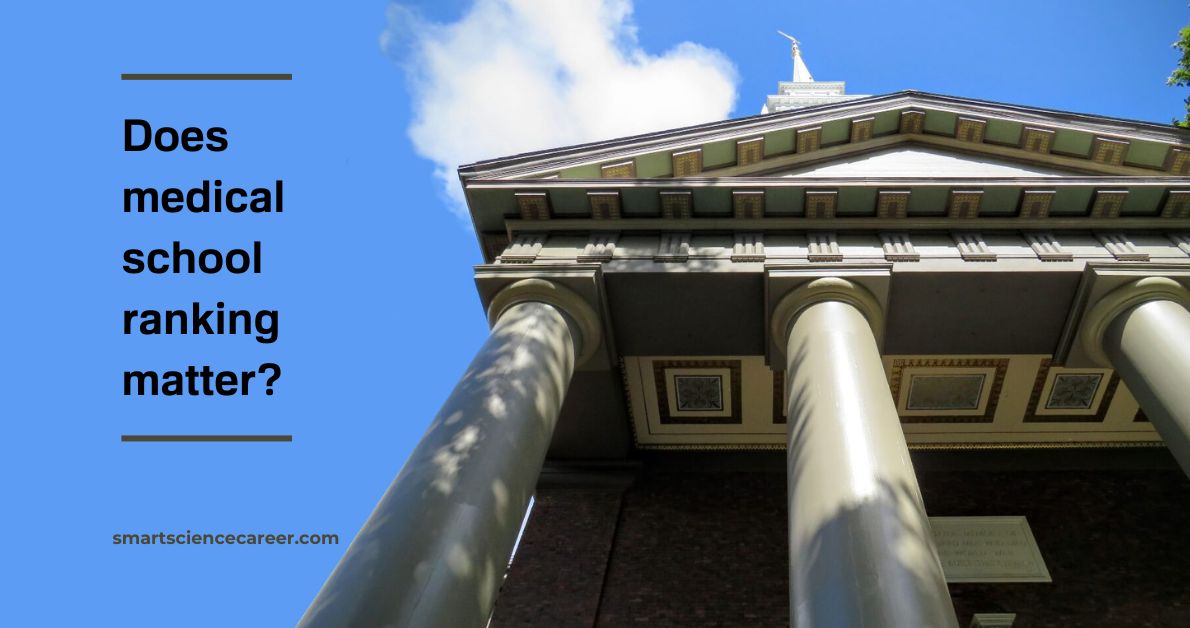Does Medical School Ranking Matter?
Medical school rankings claim to help you find the best place to study medicine or to become an instructor or researcher. They suggest that you can measure an institution’s reputation and use this information to pursue a more successful career as a doctor or scientist. Is this true? Are medical school rankings important, or is it all fake?
You may have guessed it! The importance of medical school rankings highly depends on your career state, ambitions, and goals. Choosing the right medical school to study medicine is quite different from selecting a suitable institution for a tenure-track position. Thus, the best medical schools mean other things in different life situations.
To understand the relevance of medical school rankings for your career, you should first understand that – in general – generating rankings for academic institutions is a huge business and is heavily debated in academia and industry. Therefore, let us start with the debate about whether medical school rank lists are trustworthy.
If you only want to know whether university ranking lists are relevant to your personal situation, just scroll down.
How to read university and medical school rankings?
The quality and value of a rank list depend on multiple factors. You should ask at least three questions to get a rough idea about the quality of a ranking and its relevance for your career decisions:
- Which type of institution did they compare? Universities or colleges in general or medical schools specifically? Worldwide, Europe, or selected countries such as the U.S. or France?
- Who made and published the ranking? Is there a bias? Whether a medical school publishes a ranking, a local political entity, a European institution, or an international magazine makes a difference and may influence the outcome.
- Which criteria did the authors use to rank the institutions? Check which criteria have the most significant impact on determining an institution’s rank. Wealth and funding, research excellence, student options, industrial linkage, alumni success, other criteria?
- Which of the criteria are relevant to your career decisions? Check carefully whether the criteria used are relevant to you.
Are university and medical school rankings trustworthy or fake?
Let me start with a simple question: Who makes rankings?
Rankings are typically conducted either by private companies such as magazines, newspapers, or websites or by state-funded governmental bodies or academics such as university researchers.
It is no surprise that the quality of each ranking differs dramatically and that there may be an economical or political intention behind the rankings. Therefore, comparing at least three rankings is the best way to use ranking lists – if you base your career decisions on them.
What are the criteria for ranking the top medical schools, colleges, and universities?
How are medical schools ranked?
To make it short: there is an abundance of criteria – and we can debate heavily on every single one.
Rankings use different parameters and put different weights on them. Some rankings consider the wealth and funding of an institution, research excellence, and research funding.
They may combine various factors such as specialization expertise, student options, acceptance rate, award numbers, clinical experience, internationalization, industrial linkage, extracurricular activities, residency training, alumni success, and other criteria. To pursue a successful career in science or medicine, you must know the most important factors for your specific career path.
Let’s discuss just a few selected examples that illustrate why some parameters may or may not be relevant to your career decisions. Thus, the following examples are not necessarily the deciding factors for your career.
Funding and wealth of an institution
Rankings may consider the funding and wealth of an institution. The financial background may indicate whether the infrastructure is excellent. For medical students, it is highly relevant whether there are sufficient numbers of instructors available and whether the teaching environment (live and online) is modern and well-equipped.
For researchers, the equipment of the personal and multi-user labs is essential. The funding and wealth of an institution may indicate whether the institution’s reputation is high and attracts a lot of donors.
Research performance
Research performance is a complicated parameter because measuring research excellence is a political minefield. There are many ways to measure research excellence, and no single metric is perfect. Different fields have different standards, and what counts as excellent research in one field may not be considered as such in another.
You can simply count the number of publications, which is a useless metric. For example, in biomedical sciences a Nature paper with a very high impact factor counts the same as a single case study with an impact factor below 1. It is also problematic that first and last authorships count the same as co-authorships.
Research performance may *not* be a suitable parameter if you want to study medicine. A strong focus on research may even result in less emphasis on teaching quality.
If you want to become a researcher at a specific institution, research performance at the University level may be a misleading parameter! It is much more critical to evaluate the performance of the specific research group or department in which you may work in the future.
There is not necessarily a strong correlation between the institution’s overall performance and a department’s specific performance. There can be excellent research groups in terrible departments or fantastic departments in unspectacular research institutions.
Research funding
Research funding as a parameter is highly relevant for researchers and less appropriate for medical students and instructors. Raising a lot of grant money may signify that the performed research is excellent. However, there is a so-called Mathew effect (“the rich get richer and the poor get poorer”).
Wealthy institutions have more political impact and influence on which research areas get funded. Thus, they increase their chances that their research lines will gain an advantage. It is possible that the funded research is not necessarily the “best” but only the one with the best political support. Furthermore, research funding is often concentrated in a few institutions and in richer countries, creating a bias.
For researchers, research funding may be a significant factor to judge the general quality of an institution. As a rule of thumb, more research funding typically means better opportunities for researchers. Do med school rankings matter? Yes, because they consider research funding – but they considr too many othr factors that might not rlevant for you as a researcher.
Wealthy institutions usually have better research infrastructure (better instruments, more bench space, better logistic support, etc.). They also may strategically support grant writing (e.g., courses on grant writing or substantial administrative support).
For medical students, research funding may not necessarily be a suitable parameter. As mentioned above, focusing on research activities may result in less emphasis on teaching quality and better medical education.
Alumni Success
Alumni success may appear as a suitable parameter for prospective medical students because it may show how well the school prepares its students for life after graduation. If a school has a lot of successful alumni, it is likely doing something right in terms of its educational offerings and career preparation.
Naturally, there is a selection bias you should consider. The best schools will strive to get the best students and will not allow the admission of weaker candidates. Thus, the success of the alumni of prestigious schools may represent an efficient pre-selection procedure and high entry standards – and not the quality of the education.
However, alumni success may indicate better networking possibilities for you as a student, instructor, or researcher because you surround yourself with persons who underwent this selection process.
Alumni Salaries
From an economic perspective, there are compelling reasons to study university rankings: According to Forbes Magazine, there is a substantial salary difference among college alumni.
They ranked the top 25 colleges in the US based on the median early career salaries of alumni: the Massachusetts Institute of Technology (MIT) is on place 1 with $98,100, while the University of California, Davis pays $68,700, thus, a difference of nearly $30,000 per year.
You may conclude from these findings that attending a higher-ranked medical school may lead to a higher salary than attending a lower-ranked program. But it is not that easy.
The authors interpret their data with care and mention that there may be several potential biases: Institutions with a substantial percentage of engineering or science graduates are likely to perform well in terms of salary comparisons.
All of the analyzed schools host very strong STEM programs. Furthermore, compared to lower-ranked schools, most top-ranked schools attract and admit a larger percentage of students from upper-income families who may have a network of influential friends and contacts vital to cultivating good job prospects.
They also have better access to mentors to support their career success. Furthermore, there may be a bias when comparing salaries from specific areas.
The top 25 institutions are located in areas with higher salaries, and graduates are likely to take their first jobs in close geographical proximity to their colleges. Thus, finding a job in an urban area results in a higher salary than a job in a rural area.
Thus, it is unclear whether the salary differences among college alumni result from attending the college or the pre-selection procedure mentioned before.
What is the most important critique of university or medical school rankings?
There is much debate about the usefulness of university rankings. There are many questions about the methodologies and parameters used, and therefore doubts about accuracy. Some argue that rankings create “perverse incentives” for universities.
It is essential to note that it appears possible to manipulate ranking systems through excessive self-citations or by researchers colluding to support each other in surveys.
Are university and medical school rankings important for medical students?
Do you get a better education?
Medical school rankings, in particular, have been criticized for being misleading for medical students. Critics argue that medical school choice is a profoundly personal decision. There may be no clear correlation between which medical schools you have attended and how well you perform in the field as a medical doctor.
Most medical programs are similar, and you will not necessarily get a better education in a top medical school – or become a better doctor. Before you choose, consider carefully whether you really want to become a doctor. You might consider not only medicine, but also dentistry, or life sciences – maybe those jobs are a better fit!
How about specialization?
Some may so argue that it is less important where you get your basic medical education. In contrast, choosing the best place for your skill development (and reputation) is more critical for your specialization.
If you pursue a career in primary care fields such as family medicine, internal medicine, pediatrics, or general obstetrics, you need pretty different skills than in hand surgery, radiation oncology, or child psychiatry.
Thus, for your medical career, the ranking of the entire university is irrelevant for choosing the best place to specialize. You will strive to find the best educators and mentors in the specific medical field.
Match rates
In the US, so-called match rates are an important factor to consider for medical students. Match Day is a term used widely in the graduate medical education community to represent the day when the National Resident Matching Program (NRMP) releases results to applicants seeking residency and fellowship training positions in the United States. The NRMP matches applicants to medical schools across the US.
Medical school applicants submit a rank-order list of programs where they wish to train, and residency programs submit a ranked list of applicants they prefer to train. The NRMP’s matching algorithm processes the two parties’ rank order lists, which creates matches between applicants and programs.
Generally speaking, elite schools have the best match rates. In other words, residency candidates have a higher chance of getting trained in the field and place of their choice.
Salary
You may further criticize that medical school rankings push pre-med students to think more about reputation and financial success than about becoming excellent physicians and caring for future patients. However, salary is one of several crucial factors to choose a position.
Notably, I did not find convincing data on whether medical students who attend top schools typically have higher salaries when they start practicing as doctors in their chosen field. There is not enough information to make this an important consideration for career decisions.
Are university and medical school rankings important for instructors?
Does med school ranking matter for instructors? Yes!
As an instructor in a medical school, your institution’s reputation may be good for your self-confidence and helps to find a better position when you change jobs. Thus, med school rankings matter when applying for a new job.
The institution’s high ranking and reputation help because they are perceived as labels of excellence. However, when applying for a new position, you have to provide more indications of high performance.
These may include excellent student evaluations, letters of recommendation, extraordinary skills in blended learning and online learning tools, curriculum development, or reliable teaching evaluation methods.
Are university and medical school rankings important for Ph.D. students and postdocs?
In another article, I argued that it does not matter to scientists where you get your college/university degree! This may be true also for a medical degree.
Does medical school ranking matter for PhD students and postdocs? Yes, the situation is different. There are strong arguments for doing your PhD or postdoc at an elite institution, but at the end of the day the investment return is difficult to measure.
To make things more challenging, a PhD or a postdoc job must be a good fit on the human level because you will spend a lot of time there; otherwise, you may experience several years of misery – independent of the outstanding reputation of your institution. Life experiences matter a lot for your future career.
Some colleagues have reported that becoming a professor in their countries is impossible without having been abroad at an elite institution.
It is a good idea to discuss the specific conditions in your country of choice with at least three independent and experienced colleagues because there seem to be considerable variations between countries and regions. In principle, you should start with the question of whether it is worth it to become a professor.
In my very personal opinion, it is much more effective to choose a great lab that fits perfectly with your skills and expertise and to perform on an excellent level. If this happens to be at an elite institution – even better. If you are a high performer, always consider free or fully funded PhD programs.
Are university and medical school rankings important for professors?
Based on my experiences in multiple selection committees, members of these committees are always impressed by candidates coming from elite institutions. Thus, it plays a role during the application process.
However, does med school ranking matter for job applicants? As an applicant for tenure-track or tenured positions, you should *not* be blinded by the reputation and ranking of a university. In contrast, you should carefully compare what the actual offer includes.
There may be bad contracts because elite institutions have many job applicants and can dictate conditions. I just list a few conditions to give you an impression of how an institution may manipulate you.
Empty promises
Any verbal commitment that is not in your contract in written form has no value. If the dean or head of department promise you bench space, staff, or intramural grants, there may always be good reasons to withdraw from the promises later. A contractual agreement is more difficult to withhold than a personal statement by the dean during job negotiations.
Competitive bench space
If your bench space depends on your performance (publications, grants), you may have a lousy year and lose your bench space. However, without bench space, you can not become competitive again.
Teaching load
You must specify your teaching in your contract – otherwise, the program directors may give you excessive teaching obligations.
Staff
Shared staff members such as technicians or PhD students can be a constant source of stress if there are no written agreements.
Thus, in my opinion, for aspiring professors, an institution’s ranking is a low-priority parameter compared to the specific offer you get from your potential future department or institute.
After deciding which criteria of medical school or college rankings are relevant for your future career decisions, you may find and use a relatively comprehensive list of global and national rankings in this article.
The following articles may also interest you:
- PA vs MD salary – are the differences relevant?
- Free PhD programs versus fully funded PhD programs
- How long does it take to complete a doctorate?
- I have no idea where I will be in two years
- Will I find a job as a scientist?
- For how long should I be a postdoc?
- Do I really have to work abroad as a scientist?
- Is being a professor worth it?
- Assistant professor and associate professor – what is the difference?
- What is a Reader at a university?
- What is tenure?
- Why salary matters in science careers
- How to ask for a letter of recommendation?





